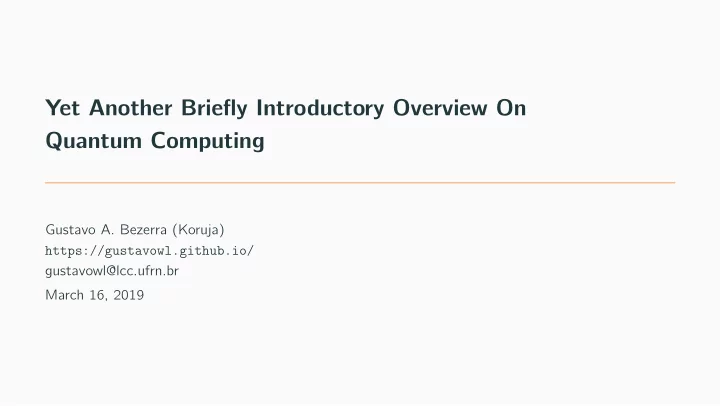

Yet Another Briefly Introductory Overview On Quantum Computing Gustavo A. Bezerra (Koruja) https://gustavowl.github.io/ gustavowl@lcc.ufrn.br March 16, 2019
Table of contents 1. Introduction 2. What’s Going On? 3. Scratching The Surface of Quantum Algorithms 4. Conclusion 1
Introduction
Motivation • Nature is described by the laws of Quantum Mechanics; • Quantum Mechanics for modelling system; • Classical vs Quantum; • Computer components’ size limitation; • Moore’s Law; • Physical limit; • Quantum phenomena. Figure 1: Graphic illustrating Moore’s law. Image downloaded from https://en.wikipedia.org/wiki/Moore%27s_law on March 15, 2019. 2
History - The Beginning • 80’s; • Solid theoretical basis [1] [2] [3] [4]; • From Science to Companies; • News; • Superficial explanation; • Advantages highlighted; • Problems not mentioned; • Reader concludes: Quantum Computing will save the World! Figure 2: Recommended books. 3
Meta Frame • Talk objective: destroy the idea of "Perfect" Computing. 4
What’s Going On?
A Bit of Information • Computers process information (Information Technology); • Information is physical; • Classical computer information: bit ; • From circuits to higher levels of abstraction. Figure 3: Half adder circuit. Image downloaded from https://en.wikipedia.org/wiki/Adder_(electronics) on March 15, 2019. 5
A Qubit of Information • Computers process information (Information Technology); • Information is physical; • Quantum computer information: qubit ( Qu antum bit ); • From circuits to no level of abstraction; Figure 4: Quantum circuit to generate a Bell state. • Back to assembly good old days. Image downloaded from https://en.wikipedia.org/wiki/Bell_state on March 15, 2019. 6
Companies • Companies own Quantum Computers; • Around 50 companies; • IBM; • Google; • D-Wave; • Why? • Costly; • Engineering challenge; • Qubits are unstable; • Avoid interactions; 1 • Extreme conditions: 10 K; 7
Companies - IBM • 50 Qubits; • IBM-Q Experience ( https: //www.research.ibm.com/ibm-q/ ); • Qiskit. Figure 5: IBM’s Quantum Computer. Image downloaded from https://www.technologyreview.com/s/609451/ ibm-raises-the-bar-with-a-50-qubit-quantum-computer/ on March 14, 2019. 8
Companies - Google • Claimed 72 Qubits; • No news ever since. Figure 6: Google’s Quantum Processor. Image downloaded from https://www.technologyreview.com/s/610274/ google-thinks-its-close-to-quantum-supremacy-heres-what-that-really-means/ on March 14, 2019. 9
Companies - D-Wave • 2048 qubits; • Specific purpose. Figure 7: D-Wave’s 2000Q. Image downloaded from https://www.dwavesys.com/d-wave-two-system on March 15, 2019. 10
Companies • Why are companies interested? • Money; • To accelerate; • Though costly, some Quantum Algorithms are faster than classical; • Quantum Supremacy; • Quantum Computers will probably be hybrid; • Quantum Computers occupy a lot of space... 11
Doesn’t it look familiar? Figure 8: ENIAC. Image downloaded from https://en.m.wikipedia.org/wiki/ENIAC on March 14, 2019. 12
Beware of Hype Cycle! Figure 9: The Hype Cycle. Image downloaded from https://www.gartner.com/en/research/methodologies/gartner-hype-cycle on March 14, 2019. 13
Scratching The Surface of Quantum Algorithms
Scratching The Surface of Quantum Algorithms • Parallelism and Quantum Parallelism; • Quantum superposition and Schrödinger’s cat; • There is no perfect analogy; • The best way to understand Quantum Mechanics is... 14
Mathematics! • Linear Algebra time! Figure 10: Snippet of Quommentaries. Image extracted from https://github.com/gustavowl/quommentaries on March 15, 2019. 15
Double Slit Experiment - Try To Keep It “Simple" Figure 11: Double slit experiment. Image downloaded from https://en.wikipedia.org/wiki/Double-slit_experiment on March 15, 2019. 16
An Outer Space Analogy • Two alien friends: Nawibo, and Odeerg; • North or South Pole; • Nawibo: relative position; • Odeerg: Poles. Figure 12: World Map. Image downloaded from https://en.wikipedia.org/wiki/World_map on March 15, 2019. 17
Bloch Sphere • Nawibo describes a state; • Odeerg measures a state; • Qubit as a vector, | ψ � = α | 0 � + β | 1 � , where α, β ∈ C , and | α | 2 + | β | 2 = 1; • Qubit as a point on the Bloch sphere, | ψ � = cos θ 2 | 0 � + e i ϕ sin θ 2 | 1 � , where θ ∈ [ 0 , π ] , and ϕ ∈ [ 0 , 2 π ) ; Figure 13: Qubit representation on a Bloch • Schrödinger’s cat. sphere. Image downloaded from https://en.wikipedia.org/wiki/Bloch_sphere on March 15, 2019. 18
Confused? Do It Yourself • First chapter of An introduction to Quantum Computing by Kaye, Laflamme and Mosca [2]; • Mach–Zehnder interferometer; • Why complex numbers are necessary. Figure 14: An Introduction to Quantum Computing’s book cover. Image downloaded from https://books.google.com.br/ on March 15, 2019. 19
Back To Quantum Parallelism • Use superposition to compute all possible values at once; • | ψ � = | 0 � + | 1 � (equatorial line); √ 2 • Apply the desired operations; • Verify the results; • Verify = measure; • Information loss; • Workaround. 20
Conclusion
Conclusion • Hype Cycle; • Get ready for disappointment; • Unpredictable future; • Quantum Computing is difficult; • Strong Mathematical basis required; • Steep learning curve; • Develop a Quantum Algorithm is challenging; • It is hard to debug. 21
References M. A. Nielsen and I. Chuang, “Quantum computation and quantum information,” 2002. P. Kaye, R. Laflamme, M. Mosca, et al. , An introduction to quantum computing . Oxford University Press, 2007. N. S. Yanofsky and M. A. Mannucci, Quantum computing for computer scientists . Cambridge University Press, 2008. R. Shankar, Principles of quantum mechanics . Springer Science & Business Media, 2012. 22
Questions? • Questions? • More info; • Blog: | ψ � ence | ϕ � ction; • E-mail: gustavowl@lcc.ufrn.br ; • Github: gustavowl; • Website: https://gustavowl.github.io/ . 23
Recommend
More recommend